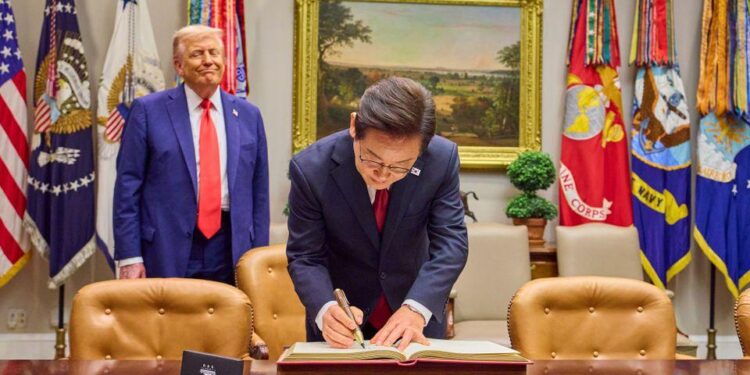In a surprising twist to the ongoing debate over internet regulation in the UK, former President Donald Trump has emerged as an unexpected figure in the battle over online free speech. As the UK government steps up efforts to police digital platforms, including communities like 4Chan that have long operated on the fringes of internet culture, questions arise about whether Trump’s outspoken stance on censorship and social media moderation could influence the future of such sites. This article explores the potential impact of Trump’s involvement on 4Chan’s struggle against the UK’s tightening internet controls, shedding light on the broader implications for online expression and regulatory authority.
Trump’s Influence on Internet Censorship Policies and the UK’s Digital Enforcement
In recent years, former President Donald Trump’s combative stance on social media platforms has inadvertently shaped internet censorship policies, not only in the US but also across the Atlantic. His public battles with tech companies over content moderation spotlighted the tension between free speech advocates and regulatory bodies, providing a unique backdrop as the UK strengthens its digital enforcement regime. Trump’s rhetoric and actions energized factions within online communities, including platforms like 4Chan, which thrive on minimal oversight and controversial content. This political dynamic has raised questions about whether his influence might catalyze a pushback against the UK’s internet policing efforts, which seek to curb misinformation, hate speech, and harmful digital content.
On the ground, the UK’s approach under the Online Safety Bill emphasizes rigorous monitoring and accountability, forcing platforms to quickly remove illegal or harmful material-or face substantial fines. Yet, Trump’s legacy in the digital realm has emboldened users who perceive these regulations as threats to freedom of expression. Below is a breakdown of key differences in regulatory focus between US and UK policies, highlighting areas where Trump’s disruptive style could clash with British enforcement priorities:
| Aspect | US Approach (Post-Trump Era) | UK Approach |
|---|---|---|
| Content Moderation | Platform discretion; reactive bans | Proactive government oversight |
| Accountability | Limited governmental action | Heavy fines and regulatory enforcement |
| Freedom of Speech | Emphasis on free speech, less regulation | Balance speech with safety mandates |
| Impact on 4Chan | Looser controls; platform bans rare | Potential for strict content removal |
- Trump’s emboldening of anti-censorship voices complicates the UK’s legal push.
- 4Chan users leverage US debates to resist UK digital clampdowns.
- The UK government remains firm on minimizing harmful online content regardless of external political narratives.
The Role of 4Chan in Online Anonymity and its Clash with UK Internet Regulations
4Chan’s foundation rests on the principle of radical online anonymity, providing a digital refuge where users can express opinions without fear of repercussion. This anonymity has been a double-edged sword; it fosters vibrant subcultures and unfiltered dialogue but also attracts controversy over unchecked content. The UK’s recent internet regulations, designed to clamp down on harmful online material through mandatory user identification and content monitoring, pose a significant threat to 4Chan’s operational ethos. Platforms like 4Chan, which rely on ephemeral posts and anonymity, now find themselves in direct conflict with regulatory frameworks that emphasize accountability and traceability.
The clash can be summarized in the table below, illustrating how 4Chan’s core attributes diverge from the UK’s internet policing goals:
| 4Chan Attribute | UK Internet Regulations Requirement |
|---|---|
| Complete user anonymity | User verification and identity disclosure |
| Ephemeral posts with no audit trail | Content archiving and moderation logs |
| Minimal content oversight | Proactive content monitoring and removal |
This growing tension has sparked speculation about whether political shifts, particularly under figures like Donald Trump, who has previously championed free speech over regulation, could influence international internet governance. If lobbying from such voices succeeds, it might create a loophole or softer approach toward platforms like 4Chan. Meanwhile, UK regulators remain steadfast, emphasizing that national safety and combating online harms must override platform permissiveness-even when it challenges traditional views of digital freedom.
Strategic Recommendations for Protecting Online Platforms from Government Surveillance
To counter increased government surveillance, online platforms must adopt a multifaceted approach focused on decentralization and encryption. Utilizing end-to-end encryption not only secures user data but also limits authorities from accessing private communications without proper legal channels. Additionally, platforms could migrate to decentralized hosting, distributing data across a network instead of relying on centralized servers vulnerable to government subpoenas or shutdowns.
Platforms should also implement robust transparency policies to inform users when government data requests occur, fostering trust and public awareness. Integrating tools such as mandatory warrant canaries, combined with rigorous data minimization protocols, can further protect users’ privacy. Below is a brief summary of key strategies platforms can adopt:
| Strategy | Benefit |
|---|---|
| End-to-End Encryption | Secures content from interception |
| Decentralized Hosting | Reduces central points of vulnerability |
| Warrant Canaries | Alerts users to legal pressure |
| Data Minimization | Limits stored sensitive information |
Final Thoughts
As the debate around internet regulation intensifies, the potential involvement of former President Trump in aiding 4Chan to circumvent the UK’s emerging internet oversight adds a new and complex dimension to the narrative. While details remain sparse, the intersection of political influence and online anonymity underscores the ongoing challenges governments face in policing digital spaces without infringing on freedom of expression. As this story develops, stakeholders on all sides will be watching closely to see how these dynamics unfold in the broader battle over internet governance.














